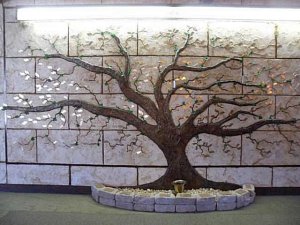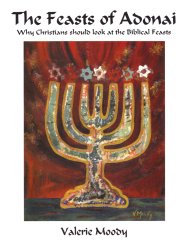God’s Covenant: with
Israel or the Church?
Part 2
| Return to Part 1 |
atonement
Long before the Israelites were unfaithful and disobedient to God, He knew that they would “blow it.” So He affirmed that for Him to remember His covenant with them, they would be required to confess their sins, humble their hearts, and pay for their sin
Jesus (Yeshua or Yahshua in Hebrew), the Son of God, was born to a virgin
Just as the blood of Pesach or Passover lambs brought about the release of the Israelites from their slavery in Egypt
dispersion and regathering
Although the State of Israel was established in 1948, and many Israelites and Jews have returned to their homeland, there still remain multitudes of Jacob’s descendants located in nations around the globe today. A great many of them have lost their identities and do not know their true roots as members of the tribes of Israel—but God does, and He has not abandoned them.
The days are coming when God will bring His people, Israel and Judah, back from the nations into which they have been dispersed; and He will restore to them the land that He originally promised to Abraham, Isaac, and Jacob/Israel
- Deuteronomy 30:1-5
- Nehemiah 1:8,9
- Isaiah 11:10-13
- Jeremiah 16:14,15 | 23:3-8 | 29:13,14 | 31:7-10,23
- Ezekiel 11:16-20 | 28:24-26 | 34:11-15 | 36:24-28,33-38 | 37:15-28 | 39:25-29
- Hosea 2:18-23
- Amos 9:14,15
- Micah 4:6-8
- Zephaniah 3:19,20
- Zechariah 8:7,8
At that time, Israel and Judah, as a unified nation, will choose to enter into a new covenant with God, having broken the first covenant with Him long ago, soon after they came out of Egypt
new covenant
The Israelites broke the ancient covenant that God had made with Abraham, Isaac, and Jacob/Israel. Later, they also broke the covenant with Israel that God had made with them through Moses.
Then Jesus/God came along after a couple of millennia and, by the shedding of His own blood, made a new or renewed covenant at Passover
However, that does not mean that they never will. A time is coming, after Jesus returns to rule and reign, when the new/renewed covenant will be restored with Israel and Judah, along with those who have been grafted and re-grafted into Israel. Soon thereafter, God will incorporate His laws into their minds and hearts, they again will be His people, they all will know Him, He will forgive and no longer remember their sins, and the old, broken covenant will become obsolete and will disappear
lost sheep of Israel
The apostle Paul, who was from the tribe of Benjamin, spoke with great sorrow about how he wished that he could be cursed and cut off from Christ (the Messiah, Jesus) in place of his (unbelieving) “brothers”—that is, on behalf of the people of Israel
Jesus Himself said that He had been sent only to the “lost sheep of Israel”
Furthermore, in speaking to those in Jerusalem, who primarily were Jewish as Jesus was, He pointed out that He had “other sheep” not of that fold or sheep pen
Ezekiel wrote about how God, eventually, will join together Israel (figuratively known as Ephraim) and Judah as one people
grafted and re-grafted
Now, how does the Church of Christian believers fit into all of this? Are they part of the new covenant? Yes, those who believe in Jesus as Lord and Savior and believe in the God of Abraham, Isaac and Jacob (Israel), understanding that Israel is His chosen nation, indirectly are part of the new covenant, but only by the grace of God. It certainly is not because they have “replaced” or “superseded” Israel as God’s chosen people.
Ruth is an example of a Gentile who was grafted into Israel. As a Moabite girl, she refused to leave her Jewish mother-in-law, Naomi. Instead, Ruth chose to return to Israel with Naomi; she insisted, “Your people will be my people and your God my God”
There are those who believe that all of the lost tribes of Israel, dispersed among the nations, have become Christian believers in Yeshua/Jesus. In some Hebraic and Messianic circles, such as the “Two House” movement, this is a foundational belief. Indeed, many genetic Israelites have become believers; however, certainly not all believers are genetic Israelites. I feel that this notion is a type of “replacement theology” or “supersessionism.”
 |
In essence, most of the “branches” within the actual “tree” of Israel have become hardened toward God
On the other hand, Gentile believers, like shoots from “wild olive trees” that have no inherent covenantal relationship with God, have recognized and accepted Jesus’ blood on the cross as atonement for their sins. Thus, they have entered into God’s new covenant with Israel—which is not a covenant that God has made directly with the Gentiles. For that reason alone, believers have been grafted into Israel’s covenantal “olive tree.” This does not mean that they have become Jews or Israelites; Gentiles retain their own personal identities, just as Jews retain theirs. However, every believer in Jesus, whether Israeli or Gentile, is one of God’s elect or chosen people.
Basically, many genetic Israelite “branches” have been broken off of their own “olive tree” because of unbelief, since their spiritual eyes have been blinded and ears made deaf
There is a precedent for being grafted in to Israel
Torah and Prophets
Obeying the rules of the Book of the Covenant
Jesus asserted that He had not come to abolish or to do away with the Law (Torah) or the Prophets but to fulfill them and, furthermore, that even the least bit of the Law would remain intact until heaven and earth disappear
The books of the Torah/Prophets are not mutually exclusive with the books of the Gospel. In fact, the Torah/Prophets and the Gospel complement each other and, together, give the complete Word of God. The Holy Spirit of God will show each earnest believer the fullness of this.
God does not change
feasts, festivals, and holy days
 Christian believers—who have been grafted into the “olive tree” of Israel—should consider observing at least some of God’s Hebraic feasts, festivals, and holy days, in the Spring and in the Fall. After all, Jesus did fulfill all four of the Spring Festivals/Holy Days at His first coming, and He will fulfill all three of the Fall Festivals/Holy Days at His second coming. They also should consider observing a seventh-day Shabbat or Sabbath
Christian believers—who have been grafted into the “olive tree” of Israel—should consider observing at least some of God’s Hebraic feasts, festivals, and holy days, in the Spring and in the Fall. After all, Jesus did fulfill all four of the Spring Festivals/Holy Days at His first coming, and He will fulfill all three of the Fall Festivals/Holy Days at His second coming. They also should consider observing a seventh-day Shabbat or Sabbath
It is fine for believers in Jesus to worship God or to have “church” on the first day of the week, Sunday—often referred to as the “Lord’s Day,” as this was the day that Jesus rose from the dead—or on any other day of the week. However, completely ignoring the seventh-day Sabbath is breaking the Fourth Commandment. On the Sabbath, no regular work should be done, and one should assemble with others, of like mind and spirit, who also observe the proper Sabbath
The Hebraic feasts, festivals, holy days, and Sabbath are part of God’s Torah and commandments to Israel. They will be observed and celebrated throughout the earth during the Millennium, when Jesus is sitting on His Throne in Jerusalem, so why not now? The Feasts of Adonai is very descriptive in explaining how to have these observances and celebrations.
Observing the Hebraic feasts, festivals, and holy days is not for the purpose of receiving forgiveness for sins, since only the blood of Yeshua/Jesus shed on the cross has done that. Nor are these observances to be performed to gain eternal salvation, since only His resurrection from the dead has provided for that
Rather, the purpose of these observances is to demonstrate an understanding and appreciation, to God, that by His grace He has allowed Gentile believers to be a part of His covenant with Abraham, Isaac, and Jacob/Israel, and to partake in His eternal promises with Israel. Israel, including the Jews, are and always will be God’s chosen and covenant people. Let those who have been grafted into the covenantal “olive tree” of Israel
| Return to Part 1 |
Ted’s Bible Commentaries
and Other Links
Comments or questions? Email Me.
![]()
Copyright © 2011– by Ted M. Montgomery, O.D. Most rights reserved.
THE HOLY BIBLE, NEW INTERNATIONAL VERSION®, NIV®
Copyright © 1973, 1978, 1984, 2011 by Biblica, Inc.®
Used by permission. All rights reserved worldwide.